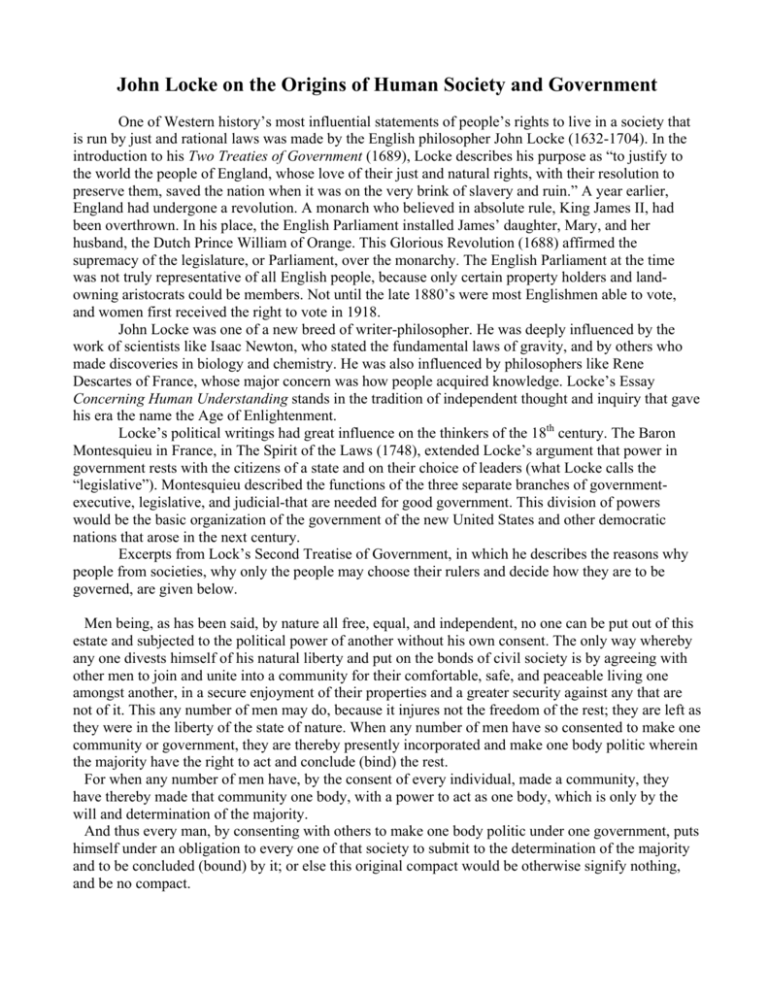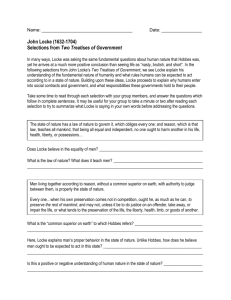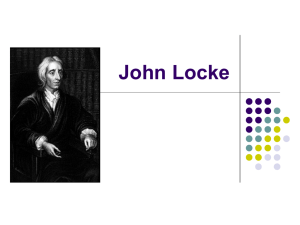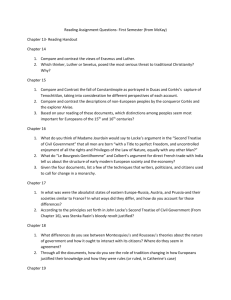Locke's Origin of Government
advertisement

John Locke on the Origins of Human Society and Government One of Western history’s most influential statements of people’s rights to live in a society that is run by just and rational laws was made by the English philosopher John Locke (1632-1704). In the introduction to his Two Treaties of Government (1689), Locke describes his purpose as “to justify to the world the people of England, whose love of their just and natural rights, with their resolution to preserve them, saved the nation when it was on the very brink of slavery and ruin.” A year earlier, England had undergone a revolution. A monarch who believed in absolute rule, King James II, had been overthrown. In his place, the English Parliament installed James’ daughter, Mary, and her husband, the Dutch Prince William of Orange. This Glorious Revolution (1688) affirmed the supremacy of the legislature, or Parliament, over the monarchy. The English Parliament at the time was not truly representative of all English people, because only certain property holders and landowning aristocrats could be members. Not until the late 1880’s were most Englishmen able to vote, and women first received the right to vote in 1918. John Locke was one of a new breed of writer-philosopher. He was deeply influenced by the work of scientists like Isaac Newton, who stated the fundamental laws of gravity, and by others who made discoveries in biology and chemistry. He was also influenced by philosophers like Rene Descartes of France, whose major concern was how people acquired knowledge. Locke’s Essay Concerning Human Understanding stands in the tradition of independent thought and inquiry that gave his era the name the Age of Enlightenment. Locke’s political writings had great influence on the thinkers of the 18th century. The Baron Montesquieu in France, in The Spirit of the Laws (1748), extended Locke’s argument that power in government rests with the citizens of a state and on their choice of leaders (what Locke calls the “legislative”). Montesquieu described the functions of the three separate branches of governmentexecutive, legislative, and judicial-that are needed for good government. This division of powers would be the basic organization of the government of the new United States and other democratic nations that arose in the next century. Excerpts from Lock’s Second Treatise of Government, in which he describes the reasons why people from societies, why only the people may choose their rulers and decide how they are to be governed, are given below. Men being, as has been said, by nature all free, equal, and independent, no one can be put out of this estate and subjected to the political power of another without his own consent. The only way whereby any one divests himself of his natural liberty and put on the bonds of civil society is by agreeing with other men to join and unite into a community for their comfortable, safe, and peaceable living one amongst another, in a secure enjoyment of their properties and a greater security against any that are not of it. This any number of men may do, because it injures not the freedom of the rest; they are left as they were in the liberty of the state of nature. When any number of men have so consented to make one community or government, they are thereby presently incorporated and make one body politic wherein the majority have the right to act and conclude (bind) the rest. For when any number of men have, by the consent of every individual, made a community, they have thereby made that community one body, with a power to act as one body, which is only by the will and determination of the majority. And thus every man, by consenting with others to make one body politic under one government, puts himself under an obligation to every one of that society to submit to the determination of the majority and to be concluded (bound) by it; or else this original compact would be otherwise signify nothing, and be no compact. The great and chief end, therefore, of men’s uniting into commonwealths and putting themselves under government is the preservation of their property. But though men when they enter into society give up the equality, liberty, and executive power they had in the state of nature into the hands of the society, to be so far disposed of the legislative as the good of the society shall require, yet it being only with an intention in every one the better to preserve himself, his liberty and property. The power of the society, or legislative constituted by them, can never be supposed to extend farther than the common good, but is obliged to secure every one’s property by providing against those defects that made the state of nature so unsafe and uneasy. Locke described three defects of the state of nature: (1) lack of established, settled, known law, by common consent to be the standard of right and wrong; (2) lack of a known and indifferent (impartial) judge with authority to determine (settle) all differences according to the established law; (3) lack of power to back and support the sentence (of judges) when right, and to give it due execution (carry it out) All and this is to be directed to no other end but the peace, safety, and public good of the people. By commonwealth, I must be understood all along to mean, not a democracy or any form of government, but any independent community which the Latins (ancient Romans) signified by the word civitas, to which the word which best answers in or language is “commonwealth,” and most properly expresses such a society of men, which “community” or “city” in English does not. The first and fundamental positive law of all commonwealths is the establishing of the legislative power; as the first and fundamental natural law which is to govern even the legislative power itself is the preservation of the society and , as far as will consist (be consistent) with the public good, of every person in it. This legislative power is not only the supreme power of the commonwealth, but sacred and unalterable in the hands where the community have once placed it; not can any edict of anybody else, in what form soever conceived or by what power soever backed, have the force and obligation of a law which has not its sanction from that legislative which the public has chosen and appointed; for without this the law could not have that which is absolutely necessary to its being a law: the consent of the society over whom nobody can have a power to make laws, but by their own consent and by authority received from them. The end of government is the good of mankind. Review Questions 1. 2. 3. 4. 5. 6. 7. 8. What event or action prompted Locke to publish his treaties of government? Why did human beings enter into civil society, according to Locke? What did Locke mean by a “commonwealth”? What end or purpose did Locke see for people uniting in a commonwealth? What was the purpose of the legislature? What was the end or ultimate purpose of government? What are the essential (unalienable) rights that every human is born with according to Locke? What are some of Locke’s ideas that are found in democratic governments today?







